
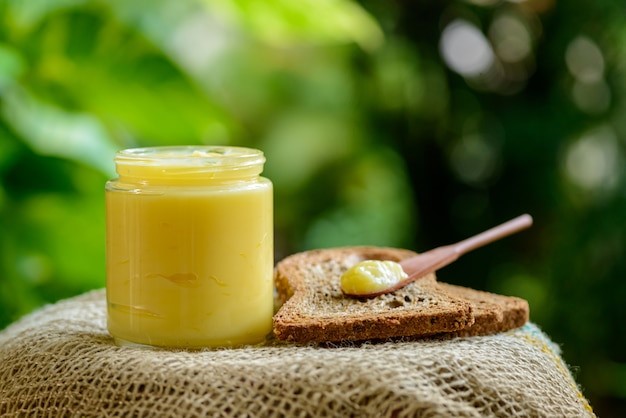
Contrary to popular belief –Desi Ghee Is Actually Good for Heart Health
It’s a common perception that when cholesterol levels rise, Desi ghee becomes a lifelong ban in many Indian households. The same mothers, grandmothers, and great-grandmothers who once generously ladled Desi ghee onto our meals are now advocating for a complete abandonment of this cherished ingredient, even on our beloved chapattis. While health concerns are valid,
“The complete exclusion of Desi ghee might not be the answer, as modern research suggests that it can be a part of a balanced diet when consumed in moderation.”
(Reference: Ghee: Its Properties, Importance and Health Benefits- published in Lipid Universe)
Balancing tradition with contemporary health wisdom is the key to savoring the essence of Desi ghee while ensuring our well-being and heart disease prevention. Join us on this enlightening journey as we delve into the heart-healthy properties of Desi ghee and select oils, and discover how they can positively impact your cholesterol levels, contributing to cardiovascular disease prevention

Ghee–clarified butter has been used in Indian Homes for centuries
Cholesterol – Role in our body & cause of heart attack
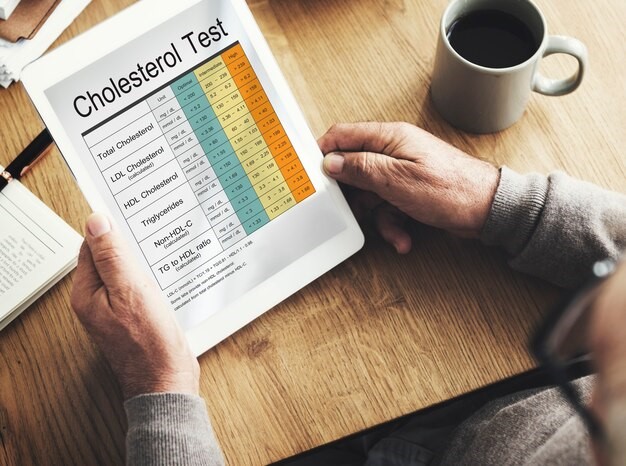
High Cholesterol in blood – indicative of poor Heart Health
To better understand the impact of Desi ghee and oils on heart health, it’s vital to grasp the significance of cholesterol levels. Cholesterol and triglycerides are the main forms of fat carried in the bloodstream. Cholesterol is transported in the blood by lipoproteins, and there are two primary types to consider:
- LDL Cholesterol (Low-Density Lipoprotein), VLDL, and Triglycerides: Often referred to as “bad” cholesterol, high levels of these types of cholesterol are associated with an increased risk of heart diseases like Coronary Artery Disease and Heart Attack.
- HDL Cholesterol (High-Density Lipoprotein): This is known as “good” cholesterol. HDL cholesterol plays a crucial role in removing LDL cholesterol from the bloodstream, ultimately reducing the risk of heart disease by cholesterol plaque build-up in arteries.
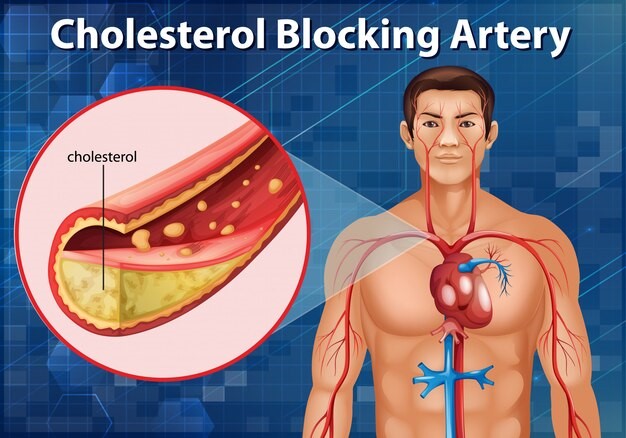
Artery Blockage due to plaque build-up of Cholesterol in Arteries – disrupting blood flow
“High cholesterol levels can significantly impact heart health by increasing the risk of heart disease. When there is an excess of low-density lipoprotein (LDL) cholesterol in the bloodstream, often referred to as “bad” cholesterol, it can gradually build up in the walls of the arteries, forming plaques.”
These deposits can constrict and obstruct the arteries, diminishing the flow of blood to the heart. In addition, high levels of cholesterol can lead to atherosclerosis, a condition that hardens and narrows the arteries. This combination of factors can ultimately result in conditions such as coronary artery disease and increase the likelihood of heart attack and other cardiovascular diseases Maintaining healthy cholesterol levels is essential for preserving heart health and reducing the risk of heart-related complications.
Desi Ghee A Heart Risky or A Heart-Healthy Fat?
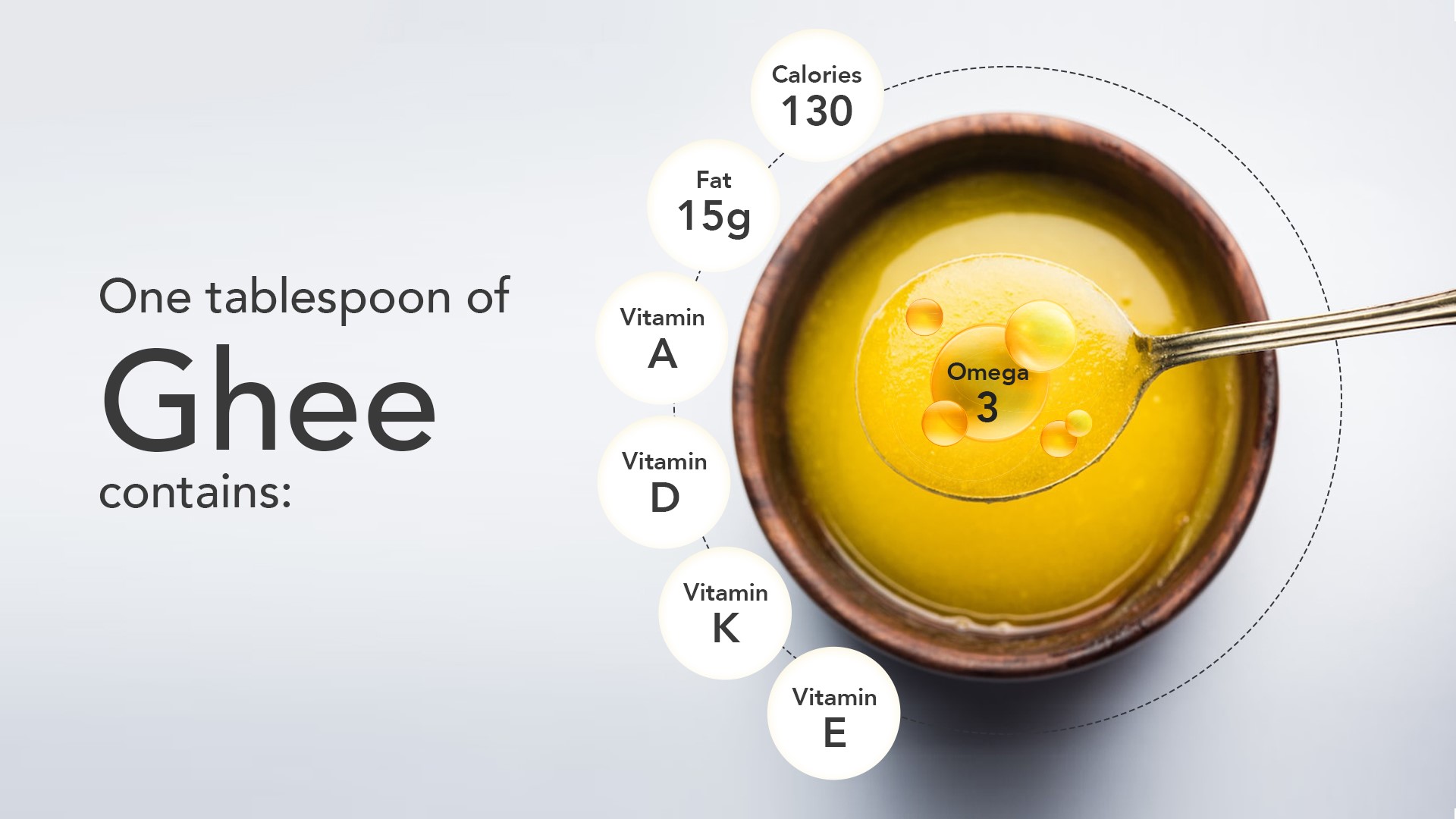
Desi Ghee is highly nutritious with numerous Health Benefits
Contrary to popular belief, recent research suggests that Desi ghee, when consumed in moderation, can have positive effects on heart health. Desi ghee, a staple in many Indian households, is a rich source of high-quality fats and essential vitamins. The use of Desi ghee has been a topic of concern due to the potential link between ghee consumption and an increased risk of cardiovascular disease. This apprehension arises from ghee’s high percentage of saturated fatty acids, which can lead to elevated cholesterol synthesis. The American Heart Association advises limiting the intake of saturated fats to less than 7% of daily energy to reduce the risk of heart disease. However, it’s crucial to clarify that:
“Ghee is often mistakenly lumped together with other saturated fats. Ghee boasts a unique carbon atom structure, notably smaller than the more common saturated fats, which contributes to its distinctive therapeutic properties, including immunity support, joint health, and antioxidant benefits”.
Furthermore, despite its high-fat content, ghee is rich in monounsaturated Omega-3 fatty acids, known to promote a healthy heart and cardiovascular disease prevention. Scientific studies indicate that when used as part of a balanced diet, ghee can play a role in reducing unhealthy cholesterol levels.
(Reference: The effect of ghee (clarified butter) on serum lipid levels and microsomal lipid peroxidation published in National Library of Medicine)
|
Myths about Desi Ghee |
Facts about Desi Ghee |
| · Heart Patients should not Consume ghee |
· Heart patients can consume ghee in moderation |
| · Ghee is high in fat |
· Ghee is high in omega-3 mono-saturated fatty acids |
|
· Avoid Ghee, it is unhealthy |
· Recommended intake of Ghee is must for Heart health, immunity, joint and skin health |
Balanced Consumption is Key:
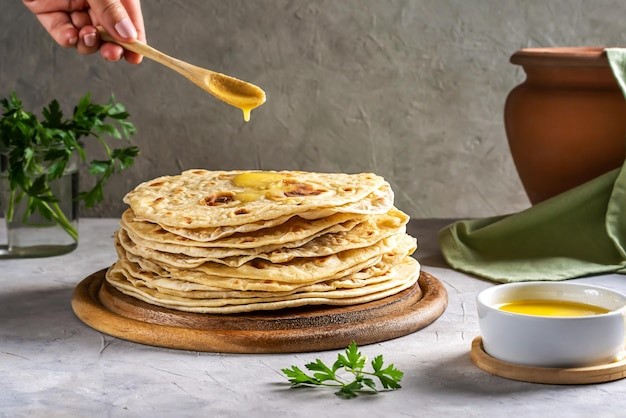
Desi ghee is beneficial only when used in moderation
It’s essential for families and loved ones to recognize the importance of a balanced consumption of Desi ghee for maintaining heart health. When incorporating Desi ghee, it’s crucial to note :
- Balance ghee consumption for a healthy diet.
- Recommended Intake is 3 tsp per day
- Not to heat it excessively, heating ghee can cause it to smoke and degrade, releasing free radicals and potentially harmful compounds.
- The use of Desi ghee in deep-fried treats like Desi ghee jalebi, Desi ghee samosa, and Desi ghee kachori should not be taken as encouragement for heart health.
- Reduce ghee intake cautiously, but do not eliminate it completely.
- Using Desi ghee in everyday dishes like chapati and dals is advisable.
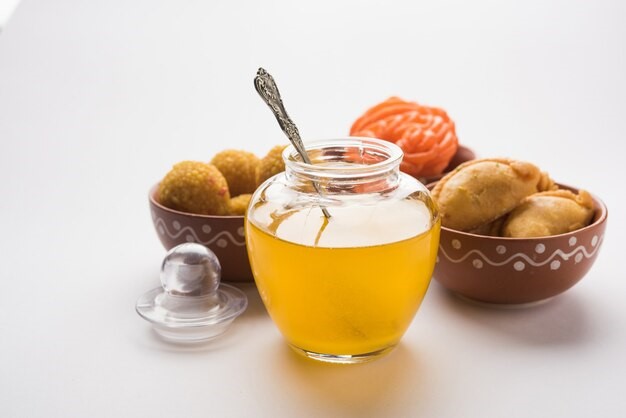
Sweets and deep-fried ghee dishes cannot be advocated as Heart -Healthy
Conclusion:
In summary, Desi ghee and heart-healthy oils have made a remarkable comeback as allies in our journey to a healthy heart. Contrary to conventional beliefs, these fats, when consumed mindfully, can positively influence cholesterol levels, particularly by increasing HDL cholesterol—the heart’s trusted protector.
So, with the details laid out, it’s clear that there’s no need to fear Desi ghee. Banning Desi ghee or oils entirely is a misconception that we’ve debunked. When enjoyed in moderation as part of a balanced diet, Desi ghee and heart-healthy oils can indeed be a wholesome and tasty addition to your meals, without compromising your well-being.
Choose your fats wisely, and embrace the path to a heart-healthy lifestyle!
